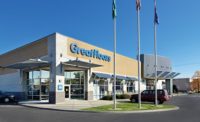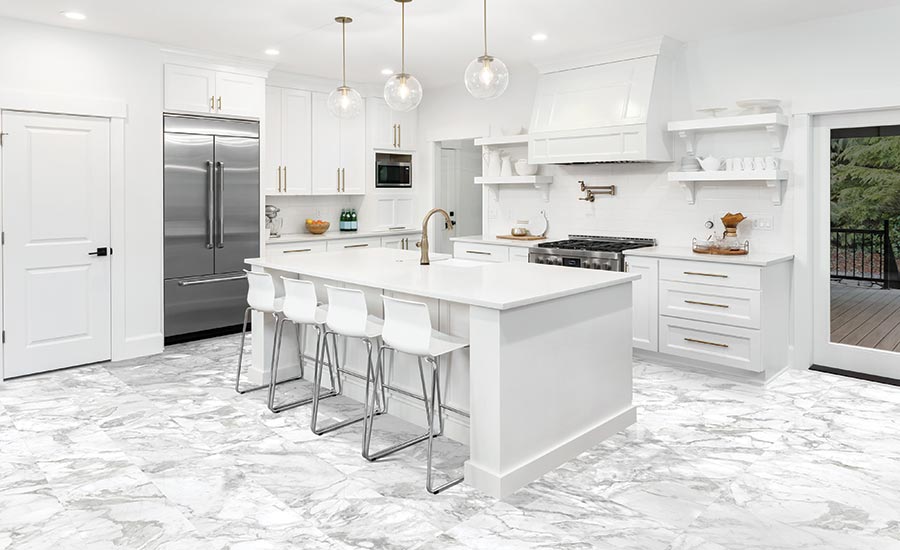A Conversation with Arley Wholesale's Scott Levy

Arley Wholesale is a leading importer and East Coast distributor of ceramic tile, stone and sundries based in Scranton, Pennsylvania.



The pandemic has affected people in different ways. We had an opportunity to sit down with Scott Levy, president of Arley Wholesale, a leading importer and East Coast distributor of ceramic tile, stone and sundries based in Scranton, Pennsylvania. Realizing that distributors perform unique tasks, many of which are on the international stage, our goal was to gain some insight into these tasks and how the company dealt with them in the midst of this never-before-experienced lockdown. The following are some excerpts from the conversation.
TF: When you heard you were going to have to operate in a lockdown pandemic situation, what actions did you take?
Levy: I was here during the 2008 financial crisis and we did a lot of things then that, looking back, I wish I had done differently. Luckily, we kept the computer folder of all the decisions we had made, the mistakes and all, and basically it was very much like an “in case of an emergency, break glass” situation. I immediately reviewed the situation and made some very quick changes. We had to do some layoffs, unfortunately, and some furloughs of some people to right-size the company for what we knew was going to be happening. This was a very regional pandemic in the beginning. It really was centered in the Seattle area and in the New York, New Jersey, Pennsylvania areas. With a company that is East Coast-based, the core of our business really was that Pennsylvania, New York, New Jersey, Delaware and Mid-Atlantic area.
When your core is essentially shut down, which is what happened, and everyone is in a lockdown, it forces you very quickly to examine how to do things differently. Luckily for Arley, we’ve always been technologically ahead and always have tried to be on the on the cutting edge of those things. We had some things already in place and then it really accelerated some initiatives.
If you don’t use the experience you’ve already gained in the past, it’s kind of foolish. We wanted to make sure that we were—we understood what we had done right, what we had done wrong and how to minimize mistakes going forward.
TF: What are some of the actions you took?
Levy: We went immediately to all electronic meetings. We had a class for people on how to run these meetings and present products to our customers efficiently. We had to cancel our yearly event, the Classic. Obviously, you can’t have a meeting with 300 people, so we had to cancel that. We had to think about new ways to introduce product launches. We had to do that electronically, so we converted all of our media and really everything we were doing to an electronic format.
Anyone that wasn’t really set up for video conferencing, we bought little cameras to put onto their desktop computers so we could start having video conferencing everywhere. We have six branches and we wanted to be able to make sure contact could be kept with everybody. Everything really went relatively quickly; it really wasn’t that hard for us. What was hard was bringing in a product and moving product out for delivery to customers. We really didn’t know which customers were open and which were closed. This totally affected all of our truck runs.
TF: Will the Zoom meetings continue long-term?
Levy: What’s happening is that it’s an easier way to get to people; virtual meetings do not replace face-to-face. Face-to-face is always going to be the best, but it’s the next best thing. It’s a good deal better than just a phone call.
And what makes it more efficient is the fact that even as I’m talking to you today, I will be talking to someone out in California later on today and I have a meeting with someone in Spain. Tomorrow, I have a meeting with someone in Turkey. I can be everywhere at one time.
Our belief going forward, even when a vaccine is available, is there will be a percentage of people that still have gotten very used to seldom leaving their homes. We have invested in technology to get us through to this point in time and we aren’t going to go throw it away. We’re going to continue to use it. We believe it’s going to be a two-part situation. It’s going to be people coming in off the street, saying they want to go to a store, but they are going to do it by appointment because they don’t want a crowd around them. Then there are people that want a virtual meeting on a one-on-one basis. The beauty of it is, the more you get away from people walking into your store, the better the closing percentage is going to be.
TF: I suspect this new virtual way of operating is more efficient. All of this is going to help the bottom line.
Levy: It should. Our people are starting to go out more now that travel restrictions are less. They’re out there, they’re going to visit stores. They need to get out to set up samples, clean them off, make sure everything is in its place. If salespeople don’t do that, eventually that relationship with the retailer will fall apart. Where virtual communications are good, though, is for product introduction.
We’ve never been a company that’s 100% one way or the other. There are thousands and thousands of customers out there and everyone has their own individual way of doing business. Our job in distribution is to work with each customer in their own individual way to make it work for their system and for our system.
TF: Speed in this situation is pivotal. It would seem being able to show more products to more people faster provides a real advantage.
Levy: Absolutely. The more ways you provide them to sell—whether it’s a physical sample, electronic or with a PDF, or with a live product on their website—it’s important to let the customer see it. By the way, we’re about to launch our own whole house visualizer. Basically, the consumer is going to be able to upload a picture of their actual room and then drop our tiles into that room and really be able to see and understand how it will look in their setting.
The more tools we can give our customers to help them sell tile to the consumer in the way that specific consumer wants to be sold, that’s the key.
TF: I suspect a major portion of the products you offer come from abroad. How has that been impacted during the pandemic?
Levy: It was difficult because everything in distribution is based upon computer models, based upon production times, time on the water, time to get into your building and get received and in stock. As COVID-19 rolled through the world, it hit different countries at different times. And it really did cause an issue especially with everything that happened with Chinese production. When the countervailing and anti-dumping charges came through, it killed the Chinese tile industry in all these factories, and Chinese producers began opening up their own different factories and moving their production to Vietnam, India or elsewhere. And then when those countries got hit by COVID-19, they got shut down.
Check out more industry Q&A's!
There were problems hitting U.S. manufacturers as well. They had to shut down certain parts of their operations, so it really had thrown a wrench into everything. It’s normalized now and things are rolling along in a more normal way, but we’re still fighting our way out of the backlog and getting some of the product to us.
Looking for a reprint of this article?
From high-res PDFs to custom plaques, order your copy today!









